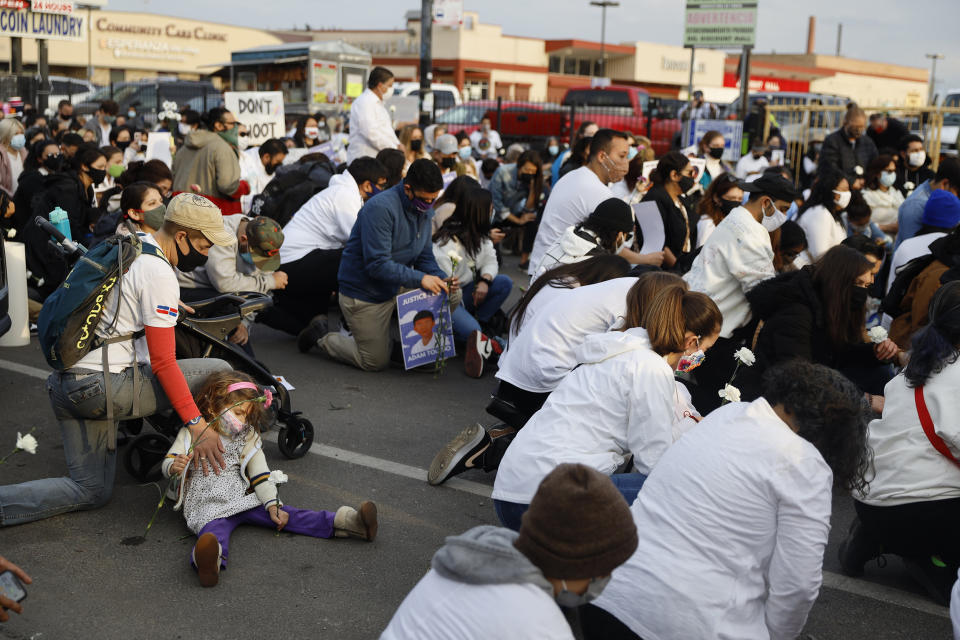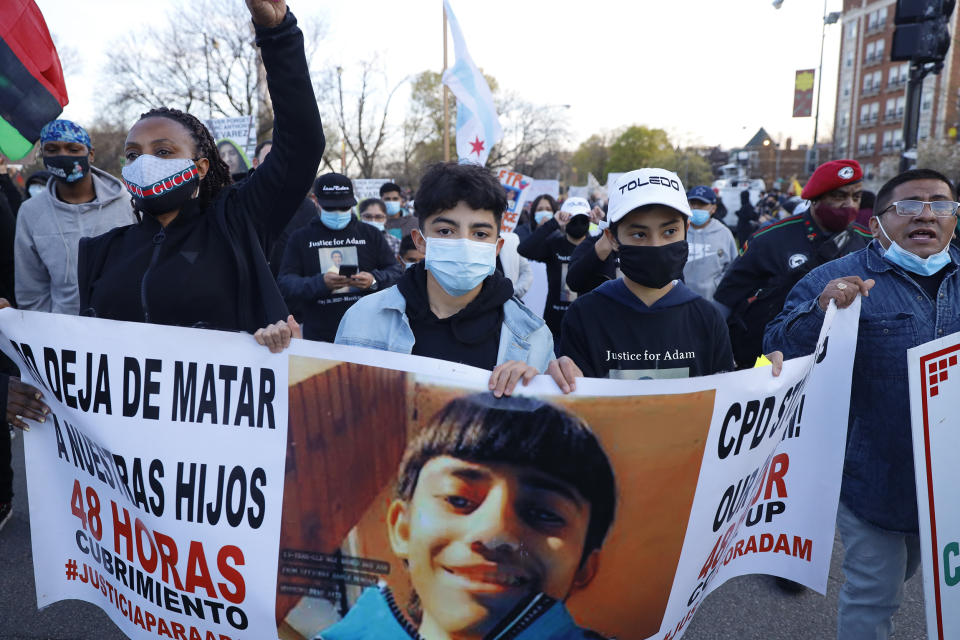Gangs and police: Youth confront harsh reality of violence in Chicago's streets
CHICAGO — One block from the home of Adam Toledo, the seventh grader fatally shot by a Chicago police officer in March, a group of young people gathered on a drizzly Tuesday morning with other volunteers to distribute boxes of food to a string of cars lined up in front of New Life Centers in the Little Village neighborhood on the city’s West Side.
The killing of the 13-year-old was still fresh on the minds of the young people at the food pantry who are not only dealing with the loss of one of their own but also with a feeling of anxiety that Adam could have easily been anyone of them.
“Nobody should ever go through that, especially a 13-year-old,” said Joseu Martinez, 19, who was helping pack food into cardboard boxes outside the faith-based nonprofit. "That really just hurt. It hurt our community. It still hurts. That could have been my little cousin,” he added.
A little over a month after the shooting, many young people in Little Village, a predominantly Latino neighborhood where Toledo lived and died, say they are still processing his death and carry with them a lingering sadness coupled with an even greater distrust of law enforcement and a system they feel has consistently failed them.
Chicago Police Officer Eric Stillman, 34, shot and killed Toledo on March 29 after a foot chase led them to the end of an alley on the east side of the neighborhood. Stillman’s bodycam footage captured the fatal encounter around 2 a.m. when he shot Toledo in the chest after the teen put his hands up.
The bodycam footage later showed Stillman shining a light on a handgun on the ground near where Toledo lay, near a 21-year-old man who was later arrested and charged with reckless discharge of a firearm and unlawful use of a weapon by a felon, as well as endangerment of a child and violating probation.
While an investigation into the shooting is underway by the Chicago Police Department, changing narratives by Cook County prosecutors regarding whether Toledo had a gun prompted the resignation of the county’s first assistant state’s attorney, Jennifer Coleman, on Wednesday.
"The tragedy of the death of a 13-year-old boy has been clouded by the confusion and frustration my office has caused and for this I apologize," State's Attorney Kim Foxx said in a statement.
The shooting added fuel to an already raging fire of mistrust between the Chicago police department and the city’s communities of color, with several mass demonstrations by thousands of protestors taking place in the city.

Feeling unnerved around police
Aaron Rivas, a street outreach member for at-risk youth with New Life Centers who was at Toledo’s wake, said his death affected the entire community but hit the younger residents especially hard.
“There's a lot of young kids out here, like Adam, and just knowing that a 13-year-old boy lost his life tells them that there's no guarantees in life. It’s a harsh reality that they deal with a lot unfortunately,” he said.
Diego R., 16, who also grew up in Little Village and is just a few years older than Toledo, said he dreamed of becoming a police officer but his plans changed after seeing the way his community has been treated by law enforcement.
“They didn’t have to murder him. I think there could have been another way for the officer to handle the situation,” he said. “I don't even feel safe in my block because of gang bangers and now with the cops doing this, I don't even feel safe around them either," said Diego, whose last name was withheld to protect his privacy.
Edwin Rabadan, the youth program director at Telpochcalli Community Education Project (TCEP), a Little Village development nonprofit, said he’s had several conversations both alone and in groups with grieving kids about the shooting over the last month.
Many are confused, Rabadan said, because they are taught to trust police but then see the effects of situations like Toledo’s, and it’s hard for them to reconcile.
“Many youth are thinking, What if Adam was one of their friends? They could have had somebody close to them in this situation.”
Their concern among the largely minority community is not displaced as the rate of police killings in Chicago and two of its large suburbs was 1.2 times higher with Latinos and 6.5 times higher with Blacks than it was with whites from 2013 to 2017, according to a Harvard study released last year.
For young people, seeing acts of violence repeatedly in their communities has far-reaching effects, said Aderonke Pederson, a psychiatrist and professor at Northwestern University Feinberg School of Medicine.
“Rather than move us in a forward direction when it comes to healing around mistrust between the police and Black communities, these types of events reinforce this idea that the police are not there in the way we want them to be for our Black and brown children, and our Black and brown children are taking in that information, and feeling more unsafe than any parent wants their children to feel,” she said. Pederson added that those feelings continue to affect children emotionally, physically and socially, and may lead to a higher risk of mental illness later in life.
Salvador P., 17, who is also a part of TCEP, said he feels “very unbalanced about the whole situation with Adam.” The high school senior, whose last name was withheld to protect his privacy, said he does not feel comfortable around police officers the way he used to.
His feelings of nervousness are shared by several others, including Yasmin Vivian, 18, a high school senior. “I just get this intense feeling when I'm around the police, no matter how he looks or who he is, or even if I know him or not. That's how I have been feeling lately, especially when I go out.”

A hurtful blame game
As youth are still reeling over Toledo's death, several overwhelming themes have repeatedly emerged from their narratives, including that they feel unheard, unprotected and frustrated with a system they believe doesn’t value them.
But another painful element for many was the divisiveness within the community over who was to blame, with many pointing fingers at Toledo himself for being out so late, and also at his mother for not knowing his whereabouts. According to the family's attorney, Toledo’s mother filed a missing persons report on Saturday for Adam, but he came home Sunday before leaving again.
Miguel Gutierrez, 19, another New Life Centers volunteer, said he was saddened by the finger-pointing that quickly ensued after the shooting. “The focus shouldn’t be on Adam’s fault, that’s not really fair. He was a kid. What the police did was messed up. He had his hands up, and they still shot him.”
Veronica Gonzalez, 26, a youth group leader at TCEP, said she is frustrated that people continue to shift blame away from the officer who shot Toledo and onto the boy and his family.
“People keep forgetting that this was a 13-year-old boy, and they have no idea what struggles he or his family was going through,” she said.
With gangs residing in the area, it takes a lot of resources and youth-based support to help guide kids in the right direction, she said. The system failed on multiple levels to provide those kinds of things to youth like Adam, Gonzalez added.
Chicago police have not confirmed whether Toledo was in a gang or if the incident leading up to his death was gang-related.
Diana Franco, 20, who was also raised in Little Village said she was deeply hurt by the “mean comments” hurled towards the boy and his family on social media.
It’s difficult for people to understand the struggles of living in a minority community with little resources and outlets for kids, she said.
“I feel like every person who points fingers should look at themselves and think how it felt to be 13," she said. "You were just trying to be part of something, to be accepted. You're clueless and you follow whatever is put right in front of you and here the reality is that it’s gangs. But, that doesn't mean that you're a bad person. That doesn't define who you are,” said Franco, who is the administrator of the New Life Centers food pantry.
She added that most kids in Little Village face similar challenges growing up and many, including her at one point, feel like they are on their own. Sometimes you just want someone to ask how they can help, instead of judging, she said. And that’s what many of the neighborhood’s youth are grappling with now, she added.
“There's a lot of Adam's out there that are lost. But they don’t deserve to get killed. Nobody, nobody, nobody deserves what happened to Adam.”

